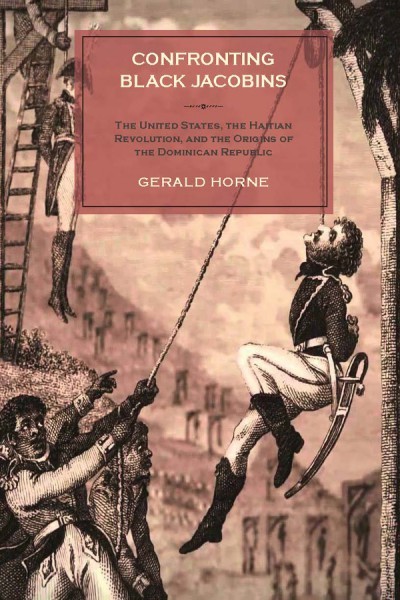On November 5, 2022, Anthony Ballas of the De Facto Podcast interviewed Dr. Gerald Horne on the current situation in Haiti, the Haitian Revolution, and U.S. involvement in the origins of the Dominican Republic.
In introduction to the interview, Ballas writes:
As Aimé Césaire once put it, ‘to study Saint-Domingue is to study one of the origins, the sources of Western civilization’ [1]. By ‘San-Domingue’ Césaire is of course referring to the Haitian Revolution and the world historical events that transpired on the island nation between 1791 and 1804, when the territory formerly known as Hispañiola was set ablaze by hundreds of thousands of revolting Africans under the leadership of Toussaint Louverture, determined to bury the slaveholding class and overthrow French colonial rule, ‘creat[ing] a general crisis for the system of slavery that could only be resolved with its collapse’ [2]….
Listen below or at De Facto Podcast
(continued from above…)
The Revolution at San-Domingue would not remain localized for long; numerous uprisings related directly or indirectly to the Haitian struggle cropped up around the Caribbean, in Jamaica, Martinique and elsewhere, and posed a particularly acute problem for planter class slaveholders on the mainland across the American south, from New Orleans to Virginia, South Carolina and beyond, seriously undermining the settler colonialism and white supremacy—its ideological handmaiden. As a thorn in the sides of both Washington and Jefferson, the Haitian Revolution and its aftermath, as well as the burgeoning Black Internationalism [3] that quickly established itself in its wake, would preoccupy the slaveholding republic for nearly the entirety of the 19th century, its impact extending north to New York via President Jean-Pierre Boyer’s migration campaign [4], and west to soon-to-be independent Texas where Sam Houston and Stephen F. Austin, the Lone Star Republic’s founding ‘freebooters,’ as Horne calls them, expressed genuine fear over the ‘horrors of San Domingue,’ and the ‘dreadful scenes of St. Domingo,’ traumatically gripping the white settler imagination [5]. This fear of a ‘second Haitian Revolution’ would not subside until well into the Civil War years, if not longer [6].
The widespread anxieties plaguing the upper social and political echelons of the United States were far from unfounded, as evinced by the spate of uprisings in the years leading up to the Civil War: Denmark Vesey in 1822, Nat Turner’s Rebellion and John Brown’s Raid on Harper’s Ferry in 1831 and 1859 respectively. Horne elucidates the often disavowed connections between Haiti and these and other revolutionary episodes that unfolded on the mainland in the decades after Haiti’s revolution. Through his characteristic style of global analysis, Horne’s analysis provides a historical and political cross-hatching between the Haitian Revolution and events taking place on the mainland often considered wholly unconnected therefrom, bringing the international implications of the Revolution into relief, and chronicling its seismic impact as the epicenter of universal emancipation against the tides of American counter-revolution.
Despite being foundational to the political, social and economic composition of the colonial world, and thus the western hemisphere more generally, Haiti and its revolution remain, to borrow Michel-Rolph Trouillot’s famous appraisal, ‘unthinkable’ [7]. Horne reminds us that Thomas Paine, Karl Marx and others too numerous to count failed to understand the impact of the Haitian Revolution in the 18th and 19th centuries, a legacy of obfuscation that continues in our present century. And although the Haitian Revolution may have at best haunted the philosophy of G.W.F. Hegel, it has become something of a commonplace by certain left Hegelians to perfunctorily allude to Haiti’s universality, a gesture that tends to paper-over rather than elucidate the tangled history of this unprecedented revolution of self-emancipated Africans—a complex history which Horne, equipped with his unrivaled method of global analysis, so thoroughly and carefully explicates in Confronting Black Jacobins and other of his works.
The United States’ interest in the origins of the Dominican Republic plays a central role in Confronting Black Jacobins, allowing Horne to, in a sense, reverse engineer the ongoing, racially-inflected political tensions between Haiti and its island neighbor. The DR recently began construction on a border fence to bar Haitian entry, a tactic similar to Viktor Orbán’s border fence project in Hungary, and, of course, Donald Trump’s endeavor to erect a barrier on the U.S.-Mexico border; the latter a particularly potent reminder of U.S. policy toward Haiti and the Global South more generally (recall when Haitian refugees attempting to cross the Rio Grande were whipped and wrangled by border patrol on horseback in late 2021, a scene itself reminiscent of the violent legacy of Black bondage which has been with this country since its origins).
Commenting on the recent meeting of Nicolàs Maduro and the newly-elected Gustavo Petro of Colombia, Horne expresses hope that just like the restoration of diplomatic ties between Venezuela and Colombia in this post-Duque epoch, he fully expects Dominicans and Haitians to join hands and similarly declare a unified identity sometime in the 21st century; an optimistic, though in no way naive, forecast of the next chapter of Haitian history.
Notes:
[1] Aimé Césaire, Toussaint Louverture, la révolution française et le problème colonial, (Présence Africaine, 2000), p. 23; also qtd. In Buck-Morss, Susan, Hegel, Haiti and Universal History, (U of Pittsburgh Press, 2004), p. 100. On the controversy with regard to Buck-Morss’ work on Haiti and Pierre Franklin Tavarès’ original dissertation work on Hegel and Haiti, please refer to Joseph, Celucien, “On Intellectual Reparations: Hegel, Franklin Tavarès, Susan Buck-Morss, Revolutionary Haiti, and Caribbean Philosophical Association,” Africology: The Journal of Pan African Studies, vol.9, no.7, September 2016, pp. 167-175, https://drcelucienjoseph.files.wordpress.com/2016/02/on-intellectual-reparation.pdf
[2] Horne, Gerald, Confronting Black Jacobins: The United States, the Haitian Revolution, and the Origins of the Dominican Republic, (Monthly Review Press, 2015), p. 10.
[3] See: Alexander, Leslie, Fear of a Black Republic: Haiti and the Birth of Black Internationalism in the United States, (U of Illinois Press, 2023).
[4] See: Horne, “Hemispheric Africans and Black Jacobins,” pp. 127-153 and “U.S. Negroes and Black Jacobins, 1830-1839,” pp. 154-177 in Confronting Black Jacobins: The United States, the Haitian Revolution, and the Origins of the Dominican Republic. See also: Alexander, Leslie, African or American: Black Identity and Political Activism in New York City, 1784-1861, (U of Illinois Press, 2012).
[5] See: Horne, Gerald, The Counter Revolution of 1836: Texas Slavery & Jim Crow and the Roots of U.S. Fascism, (International Publishers, 2022).
[6] See: Clavin, Matthew, Toussaint Louverture and the American Civil War: The Promise and Peril of a Second Haitian Revolution, (U of Pennsylvania Press, 2010).
[7] See: Trouillot, Michel-Rolph, Silencing the Past: Power and the Production of History, (Beacon Press, 1995).


Comments are closed.